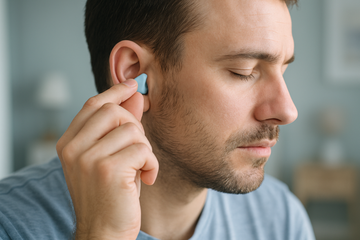
Tinnitus, the persistent ringing, buzzing, or hissing in your ears, can make silence feel overwhelming. Even if it's soft or loud, occasional or daily, the impact on your mental focus, sleep, and emotional well-being can be significant. In search of relief, many people ask: Are earplugs good for tinnitus?
To understand this, you need to understand the hows, whens and dos behind it. In this blog, we will be discussing in detail when earplugs are helpful (and when they’re not), and how to use them safely for tinnitus. You’ll also learn how earplugs can complement broader strategies like sound therapy to better manage your symptoms and protect your hearing health long-term.
Safe Techniques for Using Earplugs with Tinnitus
Can earplugs worsen tinnitus symptoms? Well, not if you use them correctly and follow these safe, expert-backed techniques.
Use Them Selectively
Avoid overusing earplugs, especially in quiet settings. Constant sound blocking can lead to auditory deprivation, making tinnitus seem louder. Only use earplugs when necessary, like in concerts, busy traffic, industrial settings, or during loud household tasks.
Choose the Right Type
Select noise-cancelling earplugs with a suitable Noise Reduction Rating (NRR). Foam or silicone plugs work for general use, but musicians or sensitive users may benefit from high-fidelity or custom-molded earplugs that reduce volume without distorting sound.
Ensure a Proper Fit
Ill-fitting earplugs can cause pressure in the ear canal or let in too much noise, both of which may irritate tinnitus. Make sure your earplugs are snug but comfortable. Consider custom-molded options if standard plugs don't fit well.
Prioritize Hygiene and Fit
Reusable earplugs should be cleaned regularly to avoid ear infections, which can worsen tinnitus. Dispose of single-use plugs after each wear, and always store them in a clean, dry case.
Test Different Materials and Designs
Earplugs for sleeping or tinnitus come in foam, silicone, wax, and filtered designs. Some people with tinnitus are more sensitive to the pressure or texture of certain materials. Try different types to see what feels least intrusive while still offering protection, comfort is key to long-term, safe use.
Pairing Earplugs with Sound Therapy: A Smarter Way to Manage Tinnitus
Earplugs should be viewed as part of a comprehensive plan for ear protection for tinnitus management. Here’s how you can combine earplugs with sound therapy effectively:
What Is Sound Therapy
Sound therapy involves using external sounds to mask, reduce the contrast of, or redirect your brain’s attention away from the internal tinnitus noise. It doesn’t cure tinnitus, but it helps reprogram how your brain interprets and responds to it.
There are three main approaches to sound therapy:
-
Masking: Playing constant low-level background sound (like white noise, rainfall, pink noise, or ambient music) to cover the tinnitus temporarily.
-
Distraction: Using varied or dynamic soundscapes (like nature sounds or melodic tones) to pull your focus away from the ringing.
-
Habituation training: Gradually exposing yourself to soft sounds over time so your brain learns to deprioritize the tinnitus, essentially, teaching your nervous system to stop reacting to it.
These sounds are delivered through sound machines, mobile apps, hearing aids, or even simple speakers during daily activities or sleep.
How to Integrate Earplugs into Sound Therapy Smartly
Can earplugs help with tinnitus? Yes, but this is where most people get it wrong: they either rely too heavily on earplugs (leading to auditory overprotection), or they skip them entirely in situations that risk worsening the condition.
Here’s how to find the balance:
-
During Sound Therapy Sessions: Avoid earplugs. The goal is for your brain to interact with gentle external sounds. Blocking them out with earplugs defeats the purpose of retraining your auditory system.
-
Outside Therapy Sessions: Use earplugs only when exposed to harsh or damaging noise levels, like at concerts, construction zones, or heavy traffic. Protecting your ears during these moments can prevent spikes in tinnitus and support the overall therapy process.
-
In Noisy Environments with Therapy Ongoing: If you're in a situation where you still want to run background sound therapy but also need protection from noise, consider filtered earplugs. These reduce harmful frequencies while allowing enough sound in for therapy to remain effective.
-
For Sleep: Some people use white noise machines alongside earplugs while sleeping. If you find the noise disturbing, a workaround is to play soft ambient sounds through a pillow speaker and use low-NRR earplugs to dampen harsh environmental noises without fully blocking therapeutic sound.
Creating a Personalized Routine
Everyone’s tinnitus profile is different. Some find relief with ocean sounds, others with brown noise or soft music. The key is consistency. Start by:
-
Using sound therapy for 1–3 hours per day, especially during focus-heavy tasks or before sleep.
-
Avoiding complete silence unless your therapist recommends it.
-
Pairing protective earplug use during high-risk sound exposure, but never as a default in quiet settings.
When to Avoid Earplugs
While they can be helpful, they’re not intended for all-day use. In very quiet environments, like your home or office, wearing earplugs too often may make your ears more sensitive to sound over time.
For most people dealing with tinnitus, earplugs can be a simple, non-drug approach to improving sleep. Just remember, if you notice ongoing discomfort or irritation, it’s a good idea to check in with a healthcare professional to make sure they’re right for you.
Conclusion
If you're new to managing tinnitus or refining a strategy that already works for you, the key lies in consistency and self-awareness. By listening to your body and staying informed, you can gradually create an environment where tinnitus feels less intrusive and more manageable, one sound at a time. For those seeking earplugs that combine advanced hearing protection with long-lasting comfort, Otifleks offers a thoughtful solution. From managing tinnitus to sleeping, commuting, or navigating noisy environments, Otifleks delivers reliable, ergonomically designed options, including shower-safe, foam, silicone earplugs, and so many more, tailored to your daily needs. Explore the full range today.





